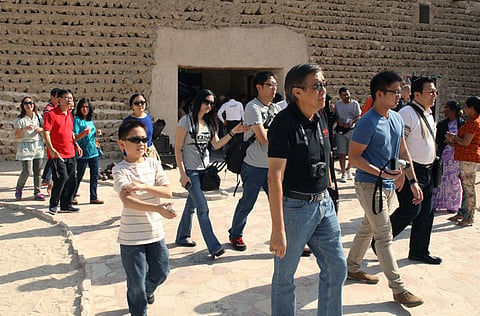Why UAE tourism is buoyant in 2014
Strong occupancy rates expected in Dubai and Abu Dhabi over the next 12 months

Dubai: The UAE’s tourism sector is expected to be robust next year, buoyed by a sustained growth in tourism numbers.
“[The sector’s growth] is backed by favourable fundamentals and driven by the positive image of Dubai,” Chiheb Ben Mahmoud, head of hotel advisory for the Middle East and Africa region at Jones Lang LaSalle, told Gulf News, adding that winning Expo 2020 will highlight Dubai and the UAE.
Hotels in Dubai have posted high occupancy rates this year - over the 80 per cent mark in the high season - and that is unlikely to change in 2014, although rates could be marginally lower.
“Occupancy levels will be marginally lower [in 2014] than in 2013 because of an increase in supply. It will hover around 78 to 80 per cent,” Peter Goddard, managing director of TRI Hospitality Consulting, said.
Dubai attracted over 7.9 million visitors in the first nine months of 2013, with hotels registering a 17.1 per cent increase in revenue to Dh 15.33 billion compared to the same time last year, according to data by Dubai’s Department of Tourism and Commerce Marketing (DTCM).
“Based on visitor numbers over the last 12 months, we expect continued and sustained growth in tourism numbers in Dubai during 2014, especially following the success of the UAE’s bid to host Expo 2020,” Ahmad Belhoul, CEO of strategy and tourism sector development at DTCM, told Gulf News in an emailed statement.
“In 2014, we will continue to work towards our goals in close partnership with public and private sector partners to attract more visitors from both our traditional source markets and emerging markets,” he said.
Hotel numbers in Dubai are expected to jump in 2014, with the expected opening of Waldorf Astoria (its soft opening was on December 24), Pullman Hotel in Jumeirah Lakes Towers, Sofitel Dubai Downtown, and Dubai Marriott Hotel Al Jaddaf, among others.
Helal Al Merri, director-general of DTCM, said in September that to double the number of visitors to Dubai from 10 million to 20 million by 2020, the number of hotels will need to be doubled.
According to the 2020 vision announced in May this year, Dubai will welcome 20 million visitors per year by 2020, which will boost the tourism sector’s contribution to the city’s economy. “This requires steady growth of around 9 per cent year-on-year,” Belhoul said.
A rise in three- and four-star hotels in Dubai is expected in the coming years, especially after an incentive was introduced in September to create more hotels in this segment. A ten per cent municipality fee will be waived for three- and four-star hotels for four years from when an initial building permit is granted, but in terms of operations, it will take an average of two years.
Abu Dhabi, Sharjah
Abu Dhabi, too, expects to see hotels open in 2014.
“We expect to see an increase in hotels between 2013 and 2016,” Mohammad Al Daheri, director of strategy and policy at Tourism and Culture Authority (TCA) Abu Dhabi, told Gulf News.
Occupancy rates in the emirate could climb to 68 per cent next year, from around 64 to 65 per cent this year, according to Goddard.
Although room rates are expected to improve as occupancy continues to grow, the new supply could “put pressure on rates,” Philip Wooller, area director of STR Global for the Middle East and Africa, warned.
The emirate welcomed more than 2.2 million guests during the first 10 months of 2013, up 16 per cent compared to the corresponding period a year ago, resulting in Dh4.3 billion of revenues, according to data by TCA Abu Dhabi. The emirate has seen an increase in hotel guests from India and the Gulf this year.
Al Daheri told Gulf News this month that he anticipates 2.5 million hotel guests by the end of this year, and 2.8 million guests in 2014.
TCA Abu Dhabi is working on promoting Abu Dhabi regionally and internationally through programmes that help encourage travel agents to promote the emirate, according to Al Daheri. The authority is also working on enhancing the experience and accessibility of the destination, he said.
Meanwhile in Sharjah, occupancy is expected to reach between 65 and 70 per cent next year, which has been the case since 2012, Goddard said. “In Sharjah, the growth rate is more static that what you see in Dubai and Abu Dhabi,” he said.
Sharjah has not seen much additional supply this year. Four Points by Sheraton Sharjah is expected to open in 2015.



